十大词性之形容词和副词(2)
- 格式:doc
- 大小:202.13 KB
- 文档页数:6
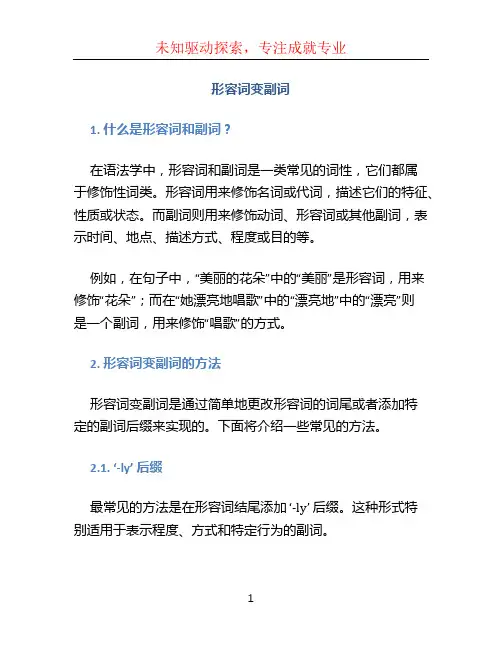
形容词变副词1. 什么是形容词和副词?在语法学中,形容词和副词是一类常见的词性,它们都属于修饰性词类。
形容词用来修饰名词或代词,描述它们的特征、性质或状态。
而副词则用来修饰动词、形容词或其他副词,表示时间、地点、描述方式、程度或目的等。
例如,在句子中,“美丽的花朵”中的“美丽”是形容词,用来修饰“花朵”;而在“她漂亮地唱歌”中的“漂亮地”中的“漂亮”则是一个副词,用来修饰“唱歌”的方式。
2. 形容词变副词的方法形容词变副词是通过简单地更改形容词的词尾或者添加特定的副词后缀来实现的。
下面将介绍一些常见的方法。
2.1. ‘-ly’ 后缀最常见的方法是在形容词结尾添加‘-ly’ 后缀。
这种形式特别适用于表示程度、方式和特定行为的副词。
例如: - quick(形容词,快)→ quickly(副词,快速地)- careful(形容词,小心的)→ carefully(副词,小心地) - loud(形容词,大声的)→ loudly(副词,大声地)需要注意的是,并非所有形容词都可以通过添加‘-ly’ 后缀变成副词。
一些形容词有其独特的变形方式。
2.2. 去除词尾的‘-e’ ,用‘-y’ 取代另一种常见的方法是去除形容词的词尾的‘e’ 并用‘y’ 取代它。
例如:- safe(形容词,安全的)→ safely(副词,安全地)- brave(形容词,勇敢的)→ bravely(副词,勇敢地) -wise(形容词,聪明的)→ wisely(副词,聪明地)这种方法特别适用于以辅音字母+’e’结尾的形容词。
2.3. 去除词尾的‘y’ ,用‘i’ 取代对于以‘y’ 结尾的形容词,可以去除‘y’ 并用‘i’ 取代。
例如: - happy(形容词,快乐的)→ happily(副词,快乐地) - easy(形容词,容易的)→ easily(副词,容易地) - busy(形容词,忙碌的)→ busily(副词,忙碌地)这个规则适用于以辅音+’y’结尾的形容词。
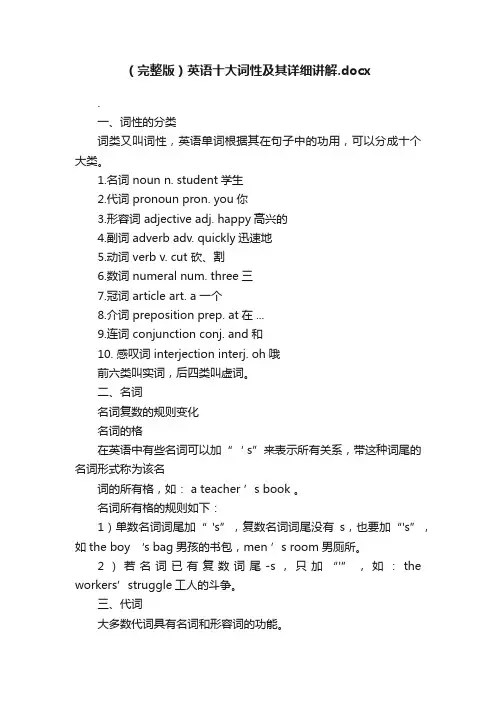
(完整版)英语十大词性及其详细讲解.docx.一、词性的分类词类又叫词性,英语单词根据其在句子中的功用,可以分成十个大类。
1.名词 noun n. student学生2.代词 pronoun pron. you你3.形容词 adjective adj. happy高兴的4.副词 adverb adv. quickly迅速地5.动词 verb v. cut 砍、割6.数词 numeral num. three三7.冠词 article art. a 一个8.介词 preposition prep. at在 ...9.连词 conjunction conj. and和10. 感叹词 interjection interj. oh哦前六类叫实词,后四类叫虚词。
二、名词名词复数的规则变化名词的格在英语中有些名词可以加“‘ s”来表示所有关系,带这种词尾的名词形式称为该名词的所有格,如:a teacher ’s book 。
名词所有格的规则如下:1)单数名词词尾加“ 's”,复数名词词尾没有s,也要加“'s”,如the boy ‘s bag男孩的书包,men ’s room男厕所。
2)若名词已有复数词尾-s,只加“'”,如:the workers’struggle工人的斗争。
三、代词大多数代词具有名词和形容词的功能。
英语中的代词,按其意义、特征及在句中的作用分为:人称代词、物主代词、指示代词、反身代词、相互代词、疑问代词、关系代词、连接代词和不定代词九种人称代词的用法:I saw her with them,at least , I thought it was her.我看到她和他们在一起,至少我认为是她。
(her 做宾语, them 做介词宾语,her 作主补)a. -- Who broke the vase?--谁打碎了花瓶?b. -- Me.--我。
并列人称代词的排列顺序1)单数人称代词并列作主语时,其顺序为:第二人称 you第三人称he/she ;it第一人称I如: You, he and I should return on time.2)复数人称代词作主语时,其顺序为:第一人称 we第二人称you第三人称they反身代词指示代词指示代词分单数(this / that )和复数(these / those )两种形式,既可作限定词又可做代词,疑问代词指人: who ,whom ,whose指物:what既可指人又可指物:which四、冠词冠词是位于名词或名词词组之前或之后,在句子里主要是对名词起限定作用的词。
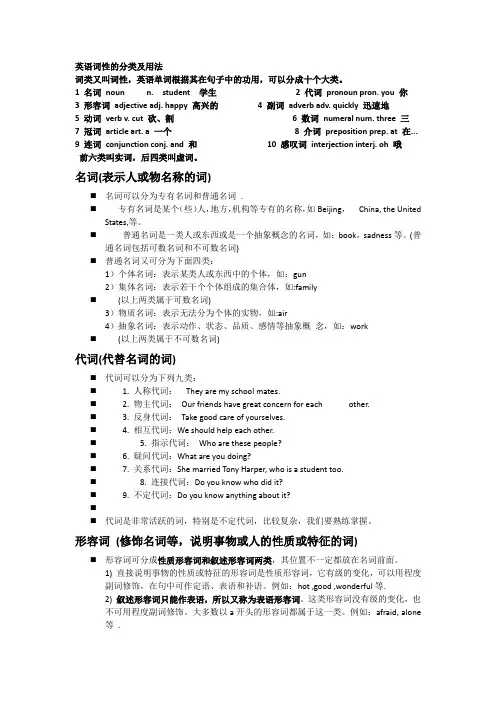
英语词性的分类及用法词类又叫词性,英语单词根据其在句子中的功用,可以分成十个大类。
1 名词noun n. student 学生2 代词pronoun pron. you 你3 形容词adjective adj. happy 高兴的4 副词adverb adv. quickly 迅速地5 动词verb v. cut 砍、割6 数词numeral num. three 三7 冠词article art. a 一个8 介词preposition prep. at 在...9 连词conjunction conj. and 和10 感叹词interjection interj. oh 哦前六类叫实词,后四类叫虚词。
名词(表示人或物名称的词)⏹名词可以分为专有名词和普通名词.⏹专有名词是某个(些)人,地方,机构等专有的名称,如Beijing,China, the UnitedStates,等。
⏹普通名词是一类人或东西或是一个抽象概念的名词,如:book,sadness等。
(普通名词包括可数名词和不可数名词)⏹普通名词又可分为下面四类:1)个体名词:表示某类人或东西中的个体,如:gun2)集体名词:表示若干个个体组成的集合体,如:family⏹(以上两类属于可数名词)3)物质名词:表示无法分为个体的实物,如:air4)抽象名词:表示动作、状态、品质、感情等抽象概念,如:work⏹(以上两类属于不可数名词)代词(代替名词的词)⏹代词可以分为下列九类:⏹ 1. 人称代词:They are my school mates.⏹ 2. 物主代词:Our friends have great concern for each other.⏹ 3. 反身代词:Take good care of yourselves.⏹ 4. 相互代词:We should help each other.⏹ 5. 指示代词:Who are these people?⏹ 6. 疑问代词:What are you doing?⏹7. 关系代词:She married Tony Harper, who is a student too.⏹8. 连接代词:Do you know who did it?⏹9. 不定代词:Do you know anything about it?⏹⏹代词是非常活跃的词,特别是不定代词,比较复杂,我们要熟练掌握。
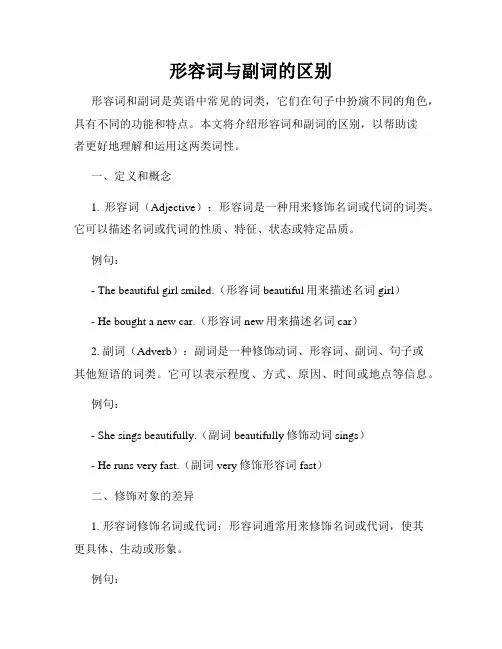
形容词与副词的区别形容词和副词是英语中常见的词类,它们在句子中扮演不同的角色,具有不同的功能和特点。
本文将介绍形容词和副词的区别,以帮助读者更好地理解和运用这两类词性。
一、定义和概念1. 形容词(Adjective):形容词是一种用来修饰名词或代词的词类。
它可以描述名词或代词的性质、特征、状态或特定品质。
例句:- The beautiful girl smiled.(形容词beautiful用来描述名词girl)- He bought a new car.(形容词new用来描述名词car)2. 副词(Adverb):副词是一种修饰动词、形容词、副词、句子或其他短语的词类。
它可以表示程度、方式、原因、时间或地点等信息。
例句:- She sings beautifully.(副词beautifully修饰动词sings)- He runs very fast.(副词very修饰形容词fast)二、修饰对象的差异1. 形容词修饰名词或代词:形容词通常用来修饰名词或代词,使其更具体、生动或形象。
例句:- The black cat is sleeping.(形容词black修饰名词cat)- She is a talented singer.(形容词talented修饰名词singer)2. 副词修饰动词、形容词、副词等:副词可以用来修饰动词、形容词、副词等,改变其程度、方式、时间、地点或原因。
例句:- He speaks English fluently.(副词fluently修饰动词speaks)- The weather is extremely hot.(副词extremely修饰形容词hot)三、句子成分的不同1. 形容词作定语:形容词常常用作名词前的定语,修饰名词,并与被修饰的名词构成完整的名词短语。
例句:- I like the blue sky.(形容词blue修饰名词sky)- He gave me a big hug.(形容词big修饰名词hug)2. 副词修饰其他词类:副词可以修饰动词、形容词、副词等,在句子中充当状语,用来说明动作的方式、程度、时间等。
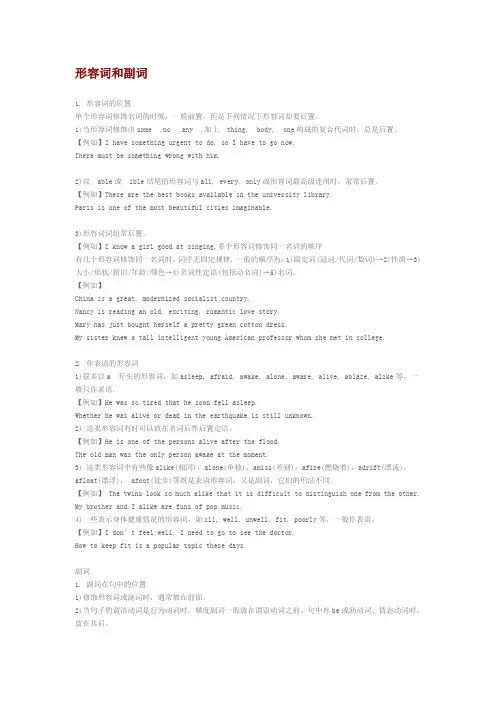
形容词和副词1. 形容词的位置单个形容词修饰名词的时候,一般前置。
但是下列情况下形容词却要后置。
1)当形容词修饰由some,no,any,加上thing,body,one构成的复合代词时,总是后置。
【例如】I have something urgent to do, so I have to go now.There must be something wrong with him.2)以able或ible结尾的形容词与all, every, only或形容词最高级连用时,常常后置。
【例如】These are the best books available in the university library.Paris is one of the most beautiful cities imaginable.3)形容词词组常后置。
【例如】I know a girl good at singing.多个形容词修饰同一名词的顺序有几个形容词修饰同一名词时,词序无固定规律,一般的顺序为:1)限定词(冠词/代词/数词)→2)性质→3)大小/形状/新旧/年龄/颜色→4)名词性定语(包括动名词)→5)名词。
【例如】China is a great, modernized socialist country.Nancy is reading an old, exciting, romantic love story.Mary has just bought herself a pretty green cotton dress.My sister knew a tall intelligent young American professor whom she met in college.2. 作表语的形容词1)很多以a开头的形容词,如asleep, afraid, awake, alone, aware, alive, ablaze, alike等,一般只作表语。
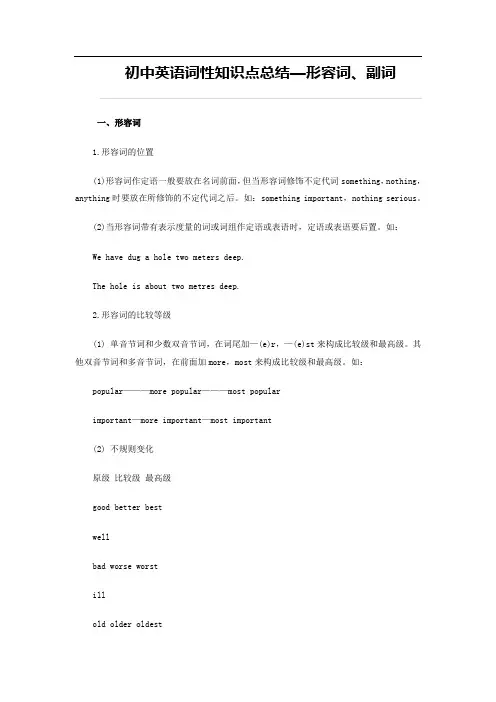
初中英语词性知识点总结—形容词、副词一、形容词1.形容词的位置(1)形容词作定语一般要放在名词前面,但当形容词修饰不定代词something,nothing,anything时要放在所修饰的不定代词之后。
如:something important,nothing serious。
(2)当形容词带有表示度量的词或词组作定语或表语时,定语或表语要后置。
如:We have dug a hole two meters deep.The hole is about two metres deep.2.形容词的比较等级(1) 单音节词和少数双音节词,在词尾加—(e)r,—(e)st来构成比较级和最高级。
其他双音节词和多音节词,在前面加more,most来构成比较级和最高级。
如:popular———more popular———most popularimportant—more important—most important(2) 不规则变化原级比较级最高级good better bestwellbad worse worstillold older oldestelder eldestmany more mostmuchlittle less leastfar farther farthestfurther furthest3. 形容词比较级的用法形容词比较级通常可分为原级、比较级、最高级三种基本形式,具体而言,它们分别以下列形式出现在句中:它们分别以下列形式出现在句中:(1)as+原级+as(2)比较级+than(3)the+最高级+of (in)...需注意的原级的用法:(1)否定结构有A..。
not as+形容词原级+as B及A...not so +形容词原级+as B两种结构。
(2)表示倍数有...times as+形容词原级+as的句型。
如:This garden is ten times as large as that one.This room is twice as large as that one.(3)half as+形容词原级+as表示“……的一半”。
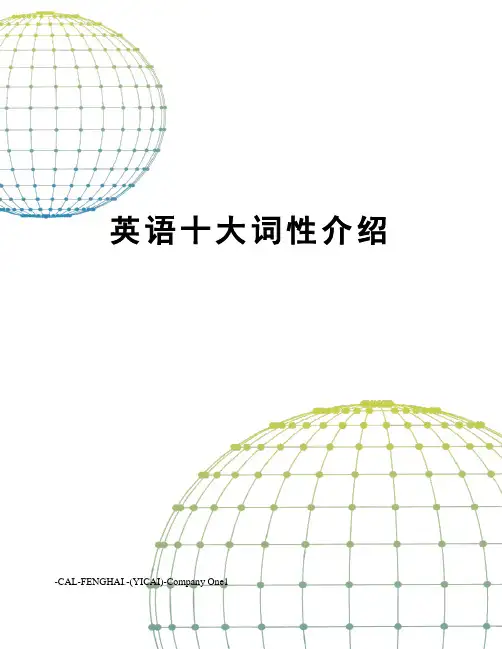
英语十大词性介绍-CAL-FENGHAI.-(YICAI)-Company One1一、英语词性的分类及用法词性的分类词类又叫词性,英语单词根据其在句子中的功用,可以分成十个大类。
1 名词 noun n. student 学生2 代词 pronoun pron. you 你3 形容词 adjective adj. happy 高兴的4 副词 adverb adv. quickly 迅速地5 动词 verb v. cut 砍、割6 数词 numeral num. three 三7 冠词 article art. a 一个8 介词 preposition prep. at 在...9 连词 conjunction conj. and 和10 感叹词 interjection interj. oh 哦前六类叫实词,后四类叫虚词。
1.名词(表示人或物名称的词)名词可以分为专有名词和普通名词 .专有名词是某个(些)人,地方,机构等专有的名称,如Beijing, China, the United States,等。
普通名词是一类人或东西或是一个抽象概念的名词,如:book,sadness等。
(普通名词包括可数名词和不可数名词)普通名词又可分为下面四类:1)个体名词:表示某类人或东西中的个体,如: gun2)集体名词:表示若干个个体组成的集合体,如: group 注:(以上两类属于可数名词)3)物质名词:表示无法分为个体的实物,如: air4)抽象名词:表示动作、状态、品质、感情等抽象概念,如: work 注:(以上两类属于不可数名词)2.代词(代替名词的词) 代词可以分为下列九类:1)人称代词:They are my school mates.2)物主代词:Our friends have great concern for each other.3)反身代词:Take good care of yourselves.4)相互代词:We should help each other.5)指示代词:Who are these people?6)疑问代词:What are you doing?7)关系代词:She married Tony Harper, who is a student too.8)连接代词:Do you know who did it?9)不定代词:Do you know anything about it?代词是非常活跃的词,特别是不定代词,比较复杂,我们要熟练掌握。
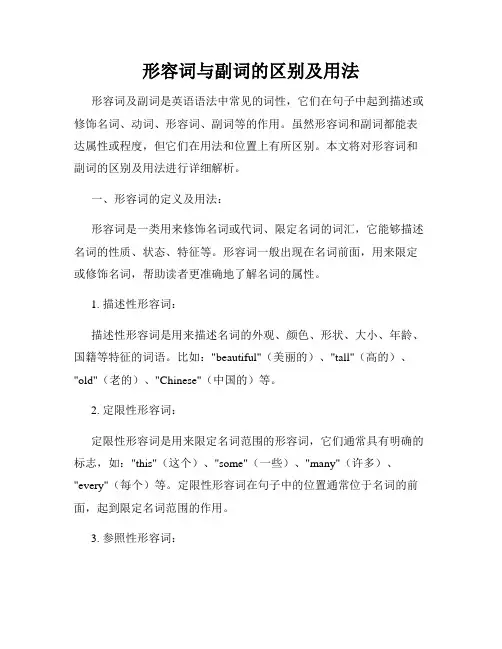
形容词与副词的区别及用法形容词及副词是英语语法中常见的词性,它们在句子中起到描述或修饰名词、动词、形容词、副词等的作用。
虽然形容词和副词都能表达属性或程度,但它们在用法和位置上有所区别。
本文将对形容词和副词的区别及用法进行详细解析。
一、形容词的定义及用法:形容词是一类用来修饰名词或代词、限定名词的词汇,它能够描述名词的性质、状态、特征等。
形容词一般出现在名词前面,用来限定或修饰名词,帮助读者更准确地了解名词的属性。
1. 描述性形容词:描述性形容词是用来描述名词的外观、颜色、形状、大小、年龄、国籍等特征的词语。
比如:"beautiful"(美丽的)、"tall"(高的)、"old"(老的)、"Chinese"(中国的)等。
2. 定限性形容词:定限性形容词是用来限定名词范围的形容词,它们通常具有明确的标志,如:"this"(这个)、"some"(一些)、"many"(许多)、"every"(每个)等。
定限性形容词在句子中的位置通常位于名词的前面,起到限定名词范围的作用。
3. 参照性形容词:参照性形容词是指与名词间具有某种关联或对比关系的形容词,它们通常是根据上下文的需要来确定其具体含义的形容词。
比如:"former"(前任的)、"same"(相同的)、"different"(不同的)等。
二、副词的定义及用法:副词是一类用来修饰动词、形容词、其他副词或整个句子的词汇,它可以表示时间、地点、程度、方式、原因、频率等概念。
副词可以帮助读者更加准确地理解句子中动作发生的时间、地点、方式以及程度等信息。
1. 时间副词:时间副词用来描述动作发生的时间,它可以回答以下问题:"when"(什么时候)或"how long"(多久)等。
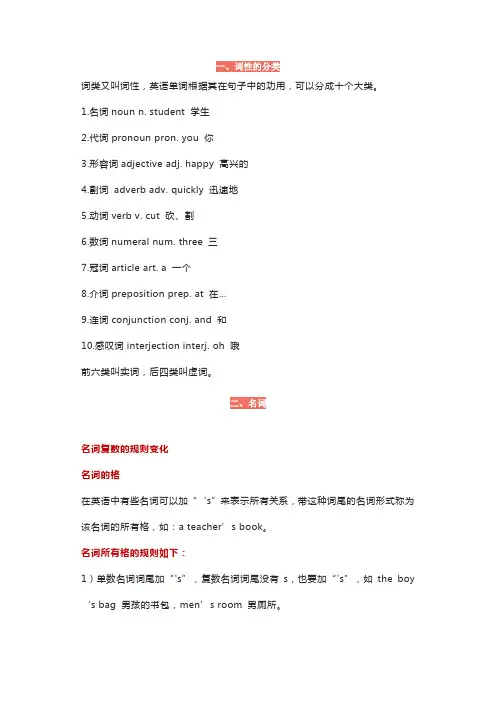
词类又叫词性,英语单词根据其在句子中的功用,可以分成十个大类。
1.名词noun n. student 学生2.代词pronoun pron. you 你3.形容词adjective adj. happy 高兴的4.副词adverb adv. quickly 迅速地5.动词verb v. cut 砍、割6.数词numeral num. three 三7.冠词article art. a 一个8.介词preposition prep. at 在...9.连词conjunction conj. and 和10.感叹词interjection interj. oh 哦前六类叫实词,后四类叫虚词。
名词复数的规则变化名词的格在英语中有些名词可以加“‘s”来表示所有关系,带这种词尾的名词形式称为该名词的所有格,如:a teacher’s book。
名词所有格的规则如下:1)单数名词词尾加“'s”,复数名词词尾没有s,也要加“'s”,如the boy ‘s bag 男孩的书包,men’s room 男厕所。
2)若名词已有复数词尾-s ,只加“'”,如:the workers’struggle工人的斗争。
大多数代词具有名词和形容词的功能。
英语中的代词,按其意义、特征及在句中的作用分为:人称代词、物主代词、指示代词、反身代词、相互代词、疑问代词、关系代词、连接代词和不定代词九种人称代词的用法:I saw her with them,at least,I thought it was her.我看到她和他们在一起,至少我认为是她。
(her做宾语,them做介词宾语,her作主补)a. -- Who broke the vase?--谁打碎了花瓶?b. -- Me.--我。
并列人称代词的排列顺序1) 单数人称代词并列作主语时,其顺序为:第二人称 you第三人称 he/she;it第一人称 I如:You, he and I should return on time.2) 复数人称代词作主语时,其顺序为:第一人称 we第二人称 you第三人称 they反身代词指示代词指示代词分单数(this / that)和复数(these / those)两种形式,既可作限定词又可做代词,疑问代词指人:who,whom,whose指物:what既可指人又可指物:which冠词是位于名词或名词词组之前或之后,在句子里主要是对名词起限定作用的词。
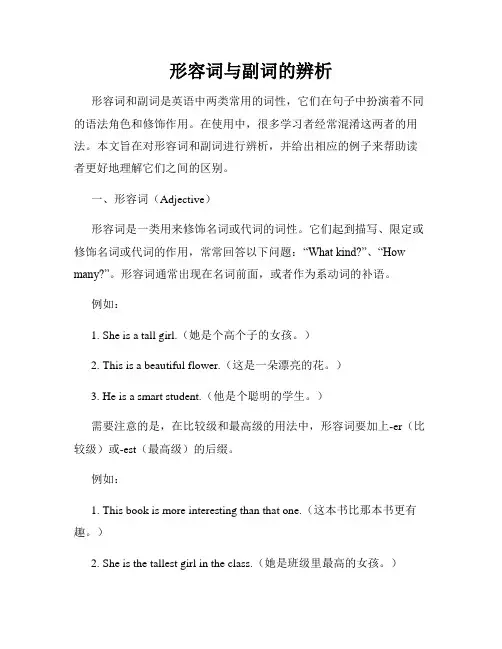
形容词与副词的辨析形容词和副词是英语中两类常用的词性,它们在句子中扮演着不同的语法角色和修饰作用。
在使用中,很多学习者经常混淆这两者的用法。
本文旨在对形容词和副词进行辨析,并给出相应的例子来帮助读者更好地理解它们之间的区别。
一、形容词(Adjective)形容词是一类用来修饰名词或代词的词性。
它们起到描写、限定或修饰名词或代词的作用,常常回答以下问题:“What kind?”、“How many?”。
形容词通常出现在名词前面,或者作为系动词的补语。
例如:1. She is a tall girl.(她是个高个子的女孩。
)2. This is a beautiful flower.(这是一朵漂亮的花。
)3. He is a smart student.(他是个聪明的学生。
)需要注意的是,在比较级和最高级的用法中,形容词要加上-er(比较级)或-est(最高级)的后缀。
例如:1. This book is more interesting than that one.(这本书比那本书更有趣。
)2. She is the tallest girl in the class.(她是班级里最高的女孩。
)二、副词(Adverb)副词是修饰动词、形容词、副词、句子或短语的词性。
它们常常回答以下问题:“How?”、“When?”、“Where?”、“To what extent?”。
副词一般用来描述动作的方式、时间、地点或程度。
例如:1. He speaks English fluently.(他能流利地讲英语。
)2. We will go shopping tomorrow.(我们明天去购物。
)3. She quickly finished her homework.(她迅速地完成了作业。
)需要注意的是,有些副词的形式和形容词相同,它们被称为“平级副词”。
平级副词不需要进行任何形式的变化,直接在副词的形式前面加上"more"(比较级)或"most"(最高级)来表示。
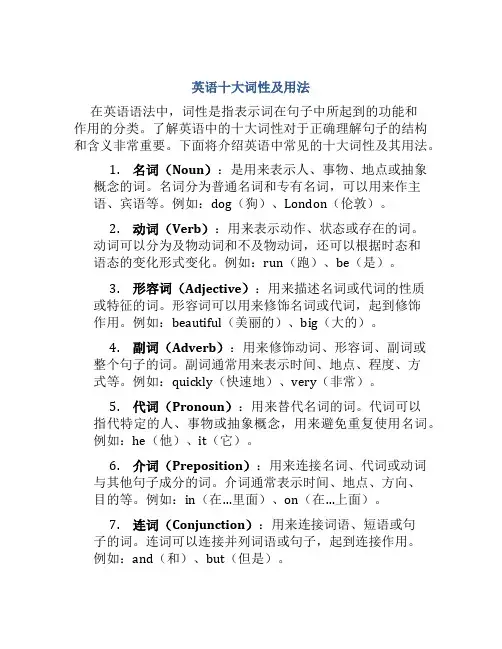
英语十大词性及用法在英语语法中,词性是指表示词在句子中所起到的功能和作用的分类。
了解英语中的十大词性对于正确理解句子的结构和含义非常重要。
下面将介绍英语中常见的十大词性及其用法。
1.名词(Noun):是用来表示人、事物、地点或抽象概念的词。
名词分为普通名词和专有名词,可以用来作主语、宾语等。
例如:dog(狗)、London(伦敦)。
2.动词(Verb):用来表示动作、状态或存在的词。
动词可以分为及物动词和不及物动词,还可以根据时态和语态的变化形式变化。
例如:run(跑)、be(是)。
3.形容词(Adjective):用来描述名词或代词的性质或特征的词。
形容词可以用来修饰名词或代词,起到修饰作用。
例如:beautiful(美丽的)、big(大的)。
4.副词(Adverb):用来修饰动词、形容词、副词或整个句子的词。
副词通常用来表示时间、地点、程度、方式等。
例如:quickly(快速地)、very(非常)。
5.代词(Pronoun):用来替代名词的词。
代词可以指代特定的人、事物或抽象概念,用来避免重复使用名词。
例如:he(他)、it(它)。
6.介词(Preposition):用来连接名词、代词或动词与其他句子成分的词。
介词通常表示时间、地点、方向、目的等。
例如:in(在…里面)、on(在…上面)。
7.连词(Conjunction):用来连接词语、短语或句子的词。
连词可以连接并列词语或句子,起到连接作用。
例如:and(和)、but(但是)。
8.冠词(Article):用来限定名词的词。
有定冠词“the”和不定冠词“a”、“an”。
冠词用来表示名词的特指和泛指。
例如:the book(那本书)、a cat(一只猫)。
9.数词(Numeral):用来表示数目、顺序或序数的词。
数词可以分为基数词和序数词,用来表示数量和顺序关系。
例如:three(三)、first(第一)。
10.感叹词(Interjection):用来表示情感、感叹或呼唤的词。
目录英语十大词性 (1)一、十大词性概述 (1)二、十大词性分类 (2)三、十大词性详述 (2)(一)实词 (2)1. 名词(nouns)n (2)2. 代词(pronoun)pron. (2)3. 数词(numeral)Num.: (3)4. 形容词(adjective)adj.或a. (3)5. 副词(adverb)adv.: (3)6. 动词(Verb)v.: (3)(二)虚词 (3)7. 冠词(article) art.: (3)8. 介词(preposition)prep.: (4)9. 连词(conjunction)conj: (4)10. 助词: (4)11. 叹词:(interjection)interj.: (4)(三)判断词 (4)(四)其他 (5)英语十大词性一、十大词性概述英语里的词汇分为10种词性,分别是:n. 名词v. 动词pron. 代词adj. 形容词adv. 副词num.数词art. 冠词prep. 介词conj. 连词int. 感叹词除这十大类词之外,英语还另有判断词yes和no。
二、十大词性分类实词:表示实在意义的词,有名词、动词、形容词、数词、量词、代词、副词。
虚词:不表示实在意义而表示语法意义的词,有:介词、连词、助词、叹词。
三、十大词性详述(一)实词1.名词(nouns)n.(1)名词是词性的一种,也是实词的一种,是指代人、物、事、时、地、情感、概念等实体或抽象事物的词。
(2)名词可以独立成句。
在短语或句子中通常可以用代词来替代。
(3)名词可以分为专有名词(Proper Nouns)和普通名词(Common Nouns)。
专有名词是某个(些)人,地方,机构等专有的名称,如Beijing,China等。
普通名词是一类人或东西或是一个抽象概念的名词,如book,sadness等。
2.代词(pronoun)pron.(1)代词是代替名词的一种词类。
(2)大多数代词具有名词和形容词的功能。
词类又叫词性,英语单词根据其在句子中的功用,可以分成十个大类。
1.名词noun n. student 学生2.代词pronoun pron. you 你3.形容词adjective adj. happy 高兴的4.副词adverb adv. quickly 迅速地5.动词verb v. cut 砍、割6.数词numeral num. three 三7.冠词article art. a 一个8.介词preposition prep. at 在...9.连词conjunction conj. and 和10.感叹词interjection interj. oh 哦前六类叫实词,后四类叫虚词。
名词复数的规则变化名词的格在英语中有些名词可以加“‘s”来表示所有关系,带这种词尾的名词形式称为该名词的所有格,如:a teacher’s book。
名词所有格的规则如下:1)单数名词词尾加“'s”,复数名词词尾没有s,也要加“'s”,如the boy‘s bag 男孩的书包,men’s room 男厕所。
2)若名词已有复数词尾-s ,只加“'”,如:the workers’struggle工人的斗争。
大多数代词具有名词和形容词的功能。
英语中的代词,按其意义、特征及在句中的作用分为:人称代词、物主代词、指示代词、反身代词、相互代词、疑问代词、关系代词、连接代词和不定代词九种人称代词的用法:I saw her with them,at least,I thought it was her.我看到她和他们在一起,至少我认为是她。
(her做宾语,them做介词宾语,her作主补)a. -- Who broke the vase?--谁打碎了花瓶?b. -- Me.--我。
并列人称代词的排列顺序1) 单数人称代词并列作主语时,其顺序为:第二人称you第三人称he/she;it第一人称I如:You, he and I should return on time.2) 复数人称代词作主语时,其顺序为:第一人称we第二人称you第三人称they反身代词指示代词指示代词分单数(this / that)和复数(these / those)两种形式,既可作限定词又可做代词,疑问代词指人:who,whom,whose指物:what既可指人又可指物:which冠词是位于名词或名词词组之前或之后,在句子里主要是对名词起限定作用的词。
英语形容词和副词归纳总结英语中的形容词和副词是用来描述名词、动词或其他形容词的词语。
它们在句子中起到修饰和限定的作用,使得表达更加准确和生动。
本文将对英语形容词和副词进行归纳总结,以帮助读者更好地理解和运用这些词语。
一、形容词(Adjectives)形容词用于描述名词,用来说明名词的性质、状态、特征等。
形容词可以直接修饰名词,也可以通过系动词(如am, is, are, feel等)与名词构成系表结构。
形容词通常放在名词前面,用来修饰名词并提供更多信息。
1. 基本形容词基本形容词是最常见的一种形容词,它们用来描述事物的性质和特征。
比如:beautiful(美丽的)、happy(快乐的)、big(大的)等。
2. 比较级形容词比较级形容词表示比较程度,用于将两个或多个事物进行比较。
常见的比较级形容词有:bigger(更大的)、happier(更快乐的)、more beautiful(更美丽的)等。
3. 最高级形容词最高级形容词表示某一事物在数量或质量上达到最高程度。
常见的最高级形容词有:the biggest(最大的)、the happiest(最快乐的)、the most beautiful(最美丽的)等。
二、副词(Adverbs)副词用于修饰动词、形容词、副词或整个句子,用来说明一种动作的方式、程度、时间、频率等。
副词的作用是使句子更加准确和详细。
1. 基本副词基本副词是最常见的一类副词,它们一般以-ly结尾,并用来修饰动词或形容词。
例如:quickly(快速地)、happily(快乐地)、carefully (小心地)等。
2. 程度副词程度副词用来表示动作或状态的强度或程度。
常见的程度副词有:very(非常)、too(过于)、extremely(极其)等。
3. 时间副词时间副词用来描述动作发生的时间或频率。
常见的时间副词有:often(经常)、always(总是)、sometimes(有时候)等。
词类又叫词性,英语单词根据其在句子中的功用,可以分成十个大类。
1.名词noun n. student 学生2.代词pronoun pron. you 你3.形容词adjective adj. happy 高兴的4.副词 adverb adv. quickly 迅速地5.动词verb v. cut 砍、割6.数词numeral num. three 三7.冠词article art. a 一个8.介词preposition prep. at 在...9.连词conjunction conj. and 和10.感叹词interjection interj. oh 哦前六类叫实词,后四类叫虚词。
名词复数的规则变化名词的格在英语中有些名词可以加“‘s”来表示所有关系,带这种词尾的名词形式称为该名词的所有格,如:a teacher’s book。
名词所有格的规则如下:1)单数名词词尾加“'s”,复数名词词尾没有s,也要加“'s”,如the boy‘s bag 男孩的书包,men’s room 男厕所。
2)若名词已有复数词尾-s ,只加“'”,如:the workers’ struggle工人的斗争。
大多数代词具有名词和形容词的功能。
英语中的代词,按其意义、特征及在句中的作用分为:人称代词、物主代词、指示代词、反身代词、相互代词、疑问代词、关系代词、连接代词和不定代词九种人称代词的用法:I saw her with them, at least, I thought it was her.我看到她和他们在一起,至少我认为是她。
(her做宾语,them做介词宾语,her作主补)a. -- Who broke the vase?--谁打碎了花瓶?b. -- Me.--我。
并列人称代词的排列顺序1) 单数人称代词并列作主语时,其顺序为:第二人称第三人称第一人称youhe/she; itI如:You, he and I should return on time.2) 复数人称代词作主语时,其顺序为:第一人称第二人称第三人称weyouthey反身代词指示代词指示代词分单数(this / that)和复数(these / those)两种形式,既可作限定词又可做代词,疑问代词指人:who, whom, whose指物: what既可指人又可指物: which冠词是位于名词或名词词组之前或之后,在句子里主要是对名词起限定作用的词。
一、词性的分类词类又叫词性,英语单词根据其在句子中的功用,可以分成十个大类。
1.名词 noun n. student 学生2.代词 pronoun pron. You 你3.形容词adjective adj. happy 高兴的4.副词 adverb adv. quickly 迅速地5.动词 verb v. cut 砍、割6.数词 numeral num. three 三前六类叫实词,后四类叫虚词。
7.冠词 article art. a 一个8.介词 preposition prep. at 在...9.连词 conjunction conj. and 和10.感叹词interjection interj. oh 哦二、名词名词复数的规则变化名词的格在英语中有些名词可以加“‘s”来表示所有关系,带这种词尾的名词形式称为该名词的所有格,如:a teacher’s book。
名词所有格的规则如下:(1)单数名词词尾加“'s”,复数名词词尾没有s,也要加“'s”,如the boy‘s bag 男孩的书包,men’s room 男厕所。
(2)若名词已有复数词尾-s ,只加“'”,如:the workers’ struggle工人的斗争。
三、代词大多数代词具有名词和形容词的功能。
英语中的代词,按其意义、特征及在句中的作用分为:人称代词、物主代词、指示代词、反身代词、相互代词、疑问代词、关系代词、连接代词和不定代词九种。
人称代词的用法:指示代词指示代词分单数(this / that)和复数(these / those)两种形式,既可作限定词又可做代词。
疑问代词指人:who, whom, whose指物: what既可指人又可指物: which四、冠词冠词是位于名词或名词词组之前或之后,在句子里主要是对名词起限定作用的词。
冠词是一种虚词。
不定冠词a (an)与数词one 同源,是“一个”的意思。
I.词法英语中的词可以根据词义、语法功能和形式特征分为十大类,即名词(noun)、代词(pronoun)、形容词(adjective)、副词(adverb)、动词(verb)、数词(numeral)、冠词(article)、介词(preposition)、连词(conjunctions)和感叹词(interjection)。
一、名词(n.) 表示人、事物或抽象概念的名称的词(一)名词的分类名词分为普通名词和专有名词,其中普通名词包括可数名词和不可数名词,可数名词可用作单数,也可用作复数。
可数名词包括个体名词(表示一类人或物的个体。
如:boy,desk,cat,window)和集体名词(由若干个体组成的集合体。
如:family,class,police)。
不可数名词包括物质名词(表示无法分为个体的实物。
如:water,paper,silk,money)和抽象名词(表示性质、行为、状态、感情或其它抽象概念。
如:work,happiness,music,difficulty,housework)专有名词表示个人、地方、机构、组织等。
如:Tom,the Great Wall,the Spring Festival,France,the United States)(二)名词的数1.可数名词有单数和复数两种形式,其复数形式的构成主要有以下几种:(1)一般情况下,在词尾加s。
eg.book——books,dog——dogs,pen——pens,boy——boys以轻辅音结尾的名词后的s的读音为[s),以浊辅音和元音结尾名词后的s读音为〔z〕。
(2)以s,x,ch,sh结尾的词名词变复数时,要在词尾加es。
eg.beach——beaches,brush——brushes,bus——buses,box—boxes(es读音为〔iz〕(3)以“辅音字母+y”结尾的名词,先变y为i,再加es。
eg.city——cities,family——families,documentary——documentaries,country——countries,strawberry——strawberries(ies读音为[iz])(注:以“元音字母+y”结尾的词,直接在词尾加-s。
易成教育个性化辅导讲义教师姓名瞿芳学科英语上课时间讲义序号学生姓名年级组长签字日期课题名称十大词性之形容词和副词(2)教学目标1.掌握形容词和副词的比较级和最高级的用法2.副词的位置和语法功能(2)教学重点难点特殊比较结构和副词分类课前检查作业完成情况:优□良□中□差□建议__________________________________________教学过程形容词、副词的比较级1、一般单、双音节词直接加-er-est。
2、不规则变化:good/well-better-best bad/ill-worse-worstlittle-less-least far-farther/further-farthest/furthest.3、没有比较级的形容词和副词。
(1)表“极限”意义和绝对概念的形容词或副词。
例:absolutely, dead, relative等(2)表带有“最”或“唯一”的形容词。
如:favorite, only, unique等比较级的修饰词:1、表程度的副词可用于修饰形容词、副词的比较级例:The patient felt a bit better today.病人今天感觉好多了。
类似的词有:much, a lot, a little, far, a great deal, by far, even 等常用比较级的句式:1、A+be+比较级+than+B例:The voyage is more exciting than the last.2、the+比较级……,the+比较级例:The farther you go into the cave, the more you’ll find.3、比较级and比较级表“越来越”……例:With a better understanding of science, they got more and more knowledge.4、no+比较级+than和not +比较级+than(1)no more than和not more than区分He is no more than 1 meter [only 仅仅]He is not more than 1 meter [ 不超过1米]Your idea is no better than his.[ 你的想法和他的一样糟]Your idea is not better than his.[你的想法没有他的好]5、by far 构成的基本句式:基本结构:by far the 和the very +最高级例:This is by far the best.这最好不过了。
He is the very best we have ever had.他是我们拥有的最好的球员。
6、最高级结构句式:(1)the+最高级+名+介词例:You are the best of all the workers.你是最好的工人。
(2)适义动词be+(the)最高级例:The traffic is busiest at this moment.此刻的交通是最繁忙的。
(3)最高级+n+but one表“第二最……”例:Tom is the coolest boy but one in the class.在班上,汤姆是第二酷的男孩。
(4)a most+adj/adv=a very……例:Their experience is a most dangerous one.他们的经历是十分危险的。
(5)the last+n+范围例:He is the last person I want to see.他是我最不想见的人。
She is the last woman in the world to tell a lie.她是一个绝不会撒谎的人(6)固定短语中使用:例:at most最多 at least 最少at worst 最坏not in the least一点也不副词的分类和位置(2)3.频度副词在否定句中的位置在否定句中,有的频度副词却必须要位于否定词not之前(如sometimes, frequently);有的频度副词则必须位于否定词之后(如always, constantly, continually, continuously,均含有“连续不断”之意),;有的频度副词可位于否定词not之后或之前(如usually, often):He doesn’t usually come here. / He usually doesn’t come here. 他通常不来这儿。
She doesn’t always come late. 她并非总是迟到。
(不能说 always doesn’t)He is sometimes not responsible for what he does. 他有时对所做的事不负责任。
1.频度副词usually和often可位于否定词not之前或之后。
如他们不常开这样的晚会。
正:They don’t often hold such parties.正:We usually don’t get up before nine on Sundays.2. 频度副词always总是位于否定词之后,不可位于否定句之前。
如:Things are not always what they seem to be.Silence must not always be read as consent.3. 频度副词sometimes总是位于否定词之前,不可位于否定词之后。
如:Jim is sometimes not very punctual.五、程度副词1.程度副词的特点程度副词用于表示程度,常见的有 fairly(公平地;诚实地), pretty(相当), rather(在一定的程度上;相当), quite(完全地;整体地;十分地;同意;不错;对的), very(完全;非常;十分;极), much(十分;差不多;几乎), too(太;再), greatly(大大地;非常), almost(几乎;差不多;差一点;将近), nearly(几乎;差不多), half(一半), highly(高度地;极;非常;非常赞许地), awfully(<口>恶劣地;令人嫌恶地<古>令人畏惧地), deeply(在深处;到深处;强烈地;深刻地;精心地;巧妙地), partly(部分地;不完全地;在一定的程度上), perfectly(完美地;理想地;完全地;十足地), really(真正地;确实地;实际地;很;十分;全然)等。
2.程度副词的用法注意点(1)程度副词主要用于修饰形容词和副词,有的还可修饰比较级(如much, rather 等)和最高级(如quite, much, almost 等):Houses are much more expensive these days. 如今的房价贵多了。
This is quite [much] the most expensive radio here. 这是这里最贵的收音机。
【注】quite 有时也修饰比较级,但只用于quite better(身体康复)这一表达。
(2)有的程度副词(如almost,barely,enough,hardly,just,(a)little,much,ne arly,quite,rather,really和scarcely。
除了much以外,其他的都可位于主要动词之前,与频度副词的用法相同)可修饰动词,但有的(如fairly, pretty, very等)则不能修饰动词:I quite agree with you. 我完全同意你的意见。
(不用fairly, pretty, very)We rather like the film. 我们很喜欢这部电影。
(不用fairly, pretty, very)3. 程度副词在句中的位置1.程度副词用在实义动词前,Be动词、助动词、情态动词之后。
I could hardly believe it.我几乎不能相信它。
2.程度副词用在形容词或副词前,enough除外。
He drives very carefully.He is old enough to go to school.3.程度副词much(…得多),even(更加)可在形容词或副词的比较级之前作修饰语。
This question is much more difficult than that one.Canada is even larger than the United States.六、连接副词1.连接副词的分类连接副词可分为两类,一类是用于连接句子或从句,常见的有therefore(因此;为此;所以), besides(而且;还有), however, moreover(此外;而且), still(仍然;依旧;还是), thus(如此;这样), meanwhile(同时;其间)等;另一类是用于引导从句或不定式,主要的有when(什么时候), why(为什么), where(在哪里), how(怎么样)等。
2.连接句子或从句的连接副词其性质类似于并列连词,使用时其前通常用分号或句号;若其前用逗号,则通常带有并列连词(如and):I don’t like it; besides, it’s too expensive. 我不喜欢它,而且也太贵了。
We all tried our best; however, we lost the game.注意,有的连接副词(如however等)后通常有逗号与句子的其他成分隔开。
另外,这类副词有的还可位于句中或句末:He may, however, come later. 不过,他也许一会儿就到。
Peter is our youngest child, and we have three others besides.彼特是我们最小的孩子,我们另外还有三个。
3.引导从句和不定式的连接副词用于引导从句(名词性从句)或不定式的连接副词主要有when, why, where, how等:Tell me when we shall leave. / Tell me when to leave. 告诉我什么时候离开。
I don’t know how I can find him. / I don’t know how to find him.Where to get the money is just our problem. 到哪里去弄这笔钱正是我们头痛的事。